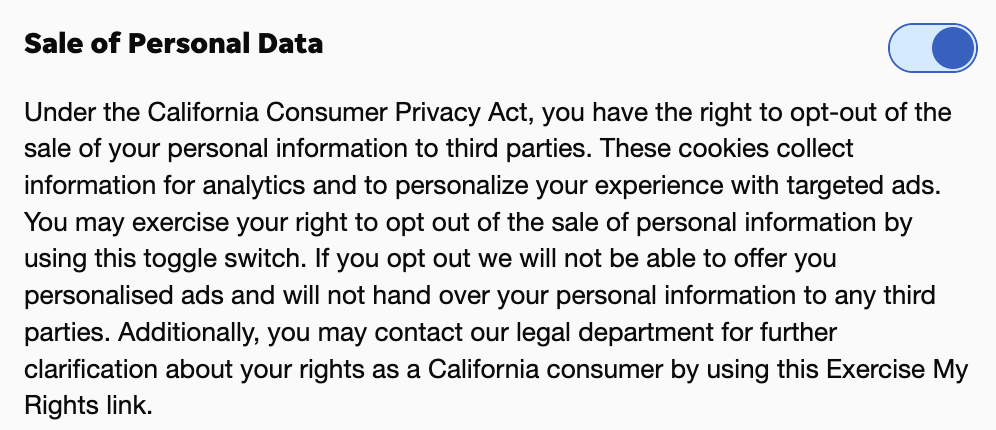
If the GDPR did what it promised to do, we’d be celebrating Privmas today. Because, two years after the GDPR became enforceable, privacy would now be the norm rather than the exception in the online world.
That hasn’t happened, but it’s not just because the GDPR is poorly enforced. It’s because it’s too easy for every damn site on the Web—and every damn business with an Internet connection—to claim compliance to the letter of GDPR while violating its spirit.
Want to see how easy? Try searching for GDPR+compliance+consent:
https://www.google.com/search?q=gdpr+compliance+consent
Nearly all of the ~21,000,000 results you’ll get are from sources pitching ways to continue tracking people online, mostly by obtaining “consent” to privacy violations that almost nobody would welcome in the offline world—exactly the kind of icky practice that the GDPR was meant to stop.
Imagine if there was a way for every establishment you entered to painlessly inject a load of tracking beacons into your bloodstream without you knowing it. And that these beacons followed you everywhere and reported your activities back to parties unknown. Would you be okay with that? And how would you like it if you couldn’t even enter without recording your agreement to accept being tracked—on a ledger kept only by the establishment, so you have no way to audit their compliance to the agreement, whatever it might be?
Well, that’s what you’re saying when you click “Accept” or “Got it” when a typical GDPR-complying website presents a cookie notice that says something like this:

That notice is from Vice, by the way. Here’s how the top story on Vice’s front page looks in Belgium (though a VPN), with Privacy Badger looking for trackers:
 What’s typical here is that a publication, with no sense of irony, runs a story about privacy-violating harvesting of personal data… while doing the same. (By the way, those red sliders say I’m blocking those trackers. Were it not for Privacy Badger, I’d be allowing them.)
What’s typical here is that a publication, with no sense of irony, runs a story about privacy-violating harvesting of personal data… while doing the same. (By the way, those red sliders say I’m blocking those trackers. Were it not for Privacy Badger, I’d be allowing them.)
Yes, Google says you’re anonymized somehow in both DoubleClick and Google Analytics, but it’s you they are stalking. (Look up stalk as a verb. Top result: “to pursue or approach prey, quarry, etc., stealthily.” That’s what’s going on.)
The main problem with the GDPR is that it effectively requires that every visitor to every website opt out of being tracked, and to do so (thank you, insincere “compliance” systems) by going down stairs into the basements of website popovers to throw tracking choice toggles to “off” positions which are typically defaulted on when you get there.
Again, let’s be clear about this: There is no way for you to know exactly how you are being tracked or what is done with information gathered about you. That’s because the instrument for that—a tool on your side—isn’t available. It probably hasn’t even been invented. You also have no record of agreeing to anything. It’s not even clear that the site or its third parties have a record of that. All you’ve got is a cookie planted deep in your browser’s bowels, designed to announce itself to other parties everywhere you go on the Web. In sum, consenting to a cookie notice leaves nothing resembling an audit trail.
Oh, and the California Consumer Protection Privacy Act (CCPA) makes matters worse by embedding opt-out into law there, while also requiring shit like this in the opt-out basement of every website facing a visitor suspected of coming from that state:

So let’s go back to a simple privacy principle here: It is just as wrong to track a person like a marked animal in the online world as it is in the offline one.
The GDPR and the CCPA were made to thwart that kind of thing. But they have failed. Instead, they have made the experience of being tracked online a worse one.
Yes, that was not their intent. And yes, both have done some good. But if you are any less followed online today than you were when the GDPR became enforceable two years ago, it’s because you and the browser makers have worked to thwart at least some tracking. (Though in very different ways, so your experience of not being followed is not a consistent one. Or even perceptible in many cases.)
So tracking remains worse than rampant: it’s defaulted practice for both advertising and site analytics. And will remain so until we have code, laws and enforcement to stop it.
So, nothing to celebrate. Not this Privmas.
Leave a Reply